 Long story short, I said a lot of hateful shit about people, and as my agent I need you to make me look like the victim. 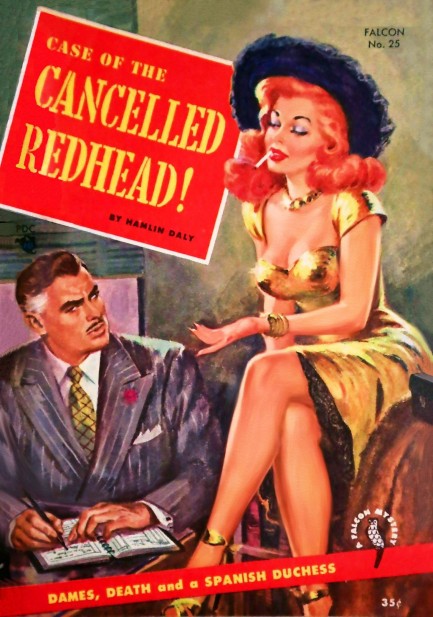
We're dying to read this. Certainly the possibilities for quips and puns based on the cover were endless, even though the type of cancellation referred to is murder, not banishment. We'll put this on our Holy Grail list and if it ever pops up we'll grab it. You see this cover all around the internet, but we first noticed it at the one and only Sleazy Digest Books. The copyright is 1952, and the art is by Howell Dodd.
 Ever wake up but feel like you're still having a nightmare? 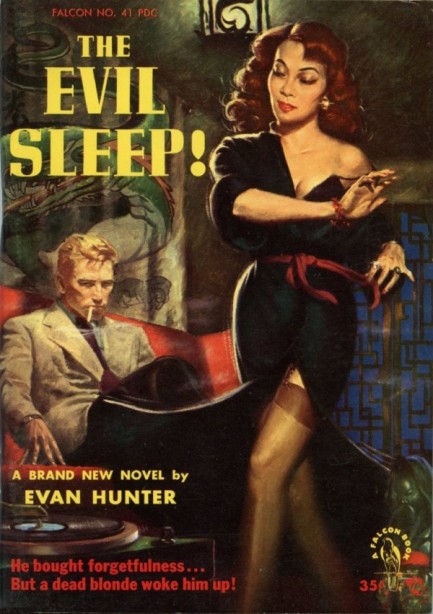
In vintage crime fiction getting the hero laid—or at least having the opportunity arise—is almost a mandatory requirement. The main character of Evan Hunter's, aka Ed McBain's, 1952 novel The Evil Sleep is a heroin addict who, at a certain point, has had cold and hot sweats all day long, hasn't showered, shaved, or brushed his teeth, yet manages to get laid by a clean, beautiful woman. This was a dead giveaway that she was shady, and dead giveaways in mysteries are something authors should avoid. Even so, The Evil Sleep is an interesting book. It's about a junkie who wakes up with a corpse, and must dodge the police, find the real murderer, and get a fix, or somehow keep his shit together without one. It was later published as So Nude, So Dead. The cover you see here, which is unattributed, came from an auction site. Our copy, which came cheap as part of a lot, is basically coverless. By which we mean the femme fatale was cut completely out, probably to end up as part of some high-school art student's collage that has long since gone to a landfill. Very naughty. If you want to buy this in good condition the price might run $400. That's even naughtier.
 Oh, come on, we're not that bad. Most of the guys we date would tell you their wives are the ones that are out of hell. 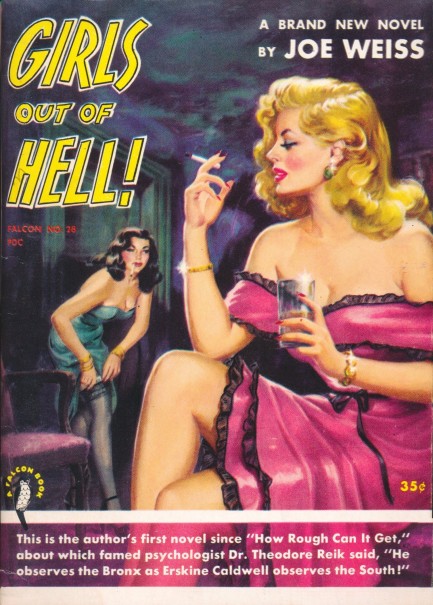
Above, Girls Out of Hell! by sleaze vet Joe Weiss, published in 1952 by Falcon Books. Weiss was also behind such titles as Gang Girl, Love Peddler, and Forbidden Thrills, for which he paired up with Ralph Dean. All those books will cost you a pretty penny. The question is whether it's because of the often excellent cover art on sleaze digests—this one is by George Gross—or because of the literary content. We intend to find out soon.
 The truth is I only listen to classical, but all the guys at those concerts are too old and frail to risk taking to bed. 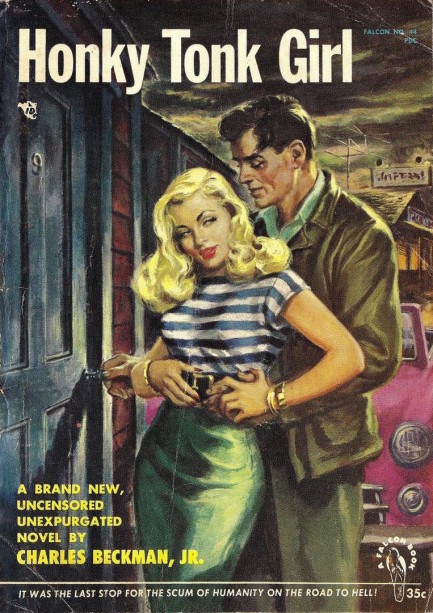
Last stop for the scum of humanity on the road to hell? Sign us up! But 1953's Honky Tonk Girl isn't the throwaway novel you'd expect. The premise is unique—a Dixieland jazz musician named Johnny Nickles fears he's recorded a haunted album. The platter, The Ghost Album, is so titled because it's a tribute to dead jazz kingpins, and seems to have heralded a series of misfortunes: the band's arranger dropped dead of a heart attack; Johnny's girlfriend stole his money and car; his band lost the cushy house gig they'd been promised; and now, playing nightly in a dive bar in nowheresville, the band's drummer has been murdered. Nickles decides to solve the case and gets help from a hooker, a chanteuse, a cop, and some obvious clues. We thought the idea of a haunted album would be the launch pad for a memorable book, but Beckman doesn't quite get this one airborne because—despite his extensive pulp pedigree—he's middling as a writer. But what does come through is his musical knowledge and familiarity with the hand-to-mouth existence of ambitious young jazzmen. We give it a 5 for prose and an 8 for atmosphere. The cover art, on the other hand, is a solid 10. It's by the always amazing Howell Dodd.
 Then I picked up something at the market and now I'm about to heat it up and enjoy it. How's your day going? 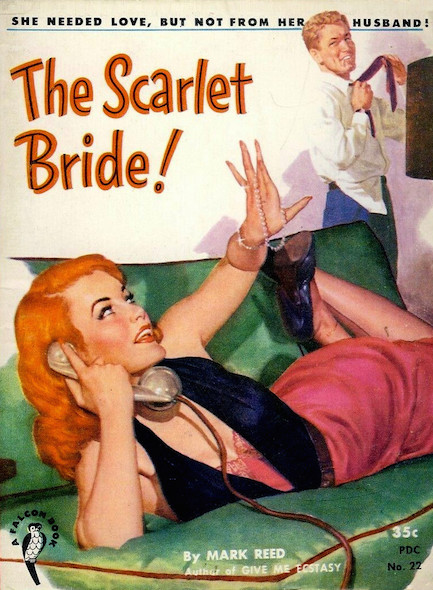
Above, a cover for The Scarlet Bride by Mark Reed, about a cheating wife with a dangerous husband and the horndogs who risk life and limb to get on her. Reed was actually Norman A. Daniels, a prolific author who wrote for pulp magazines, where he created the character Black Bat (the second, more popular one). He also wrote for radio, television, and once published eighteen books in a two year span. This particular effort is copyright 1952.
 Aussie publisher beats the life out of a classic Howell Dodd cover. 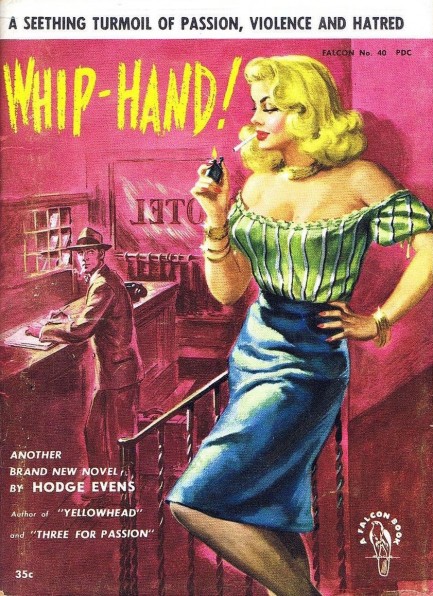
Didn't we just share a cover for Whip Hand? We did, but that was a totally different book. That was Whip Hand by W. Franklin Sanders, 1961, and this one is Whip Hand! by Hodge Evens, 1952. And as you can see below, this is yet another book for which the art was copied by a foreign publishing company—Sydney, Australia based Star Books, in 1953. It may seem impossible that Dodd didn't know of this, but back then it was indeed likely he had no clue. And even if he did know, there's little he could have done. Whoever painted this was not credited, and why would they be? Compared to Dodd's original it's pretty limp. 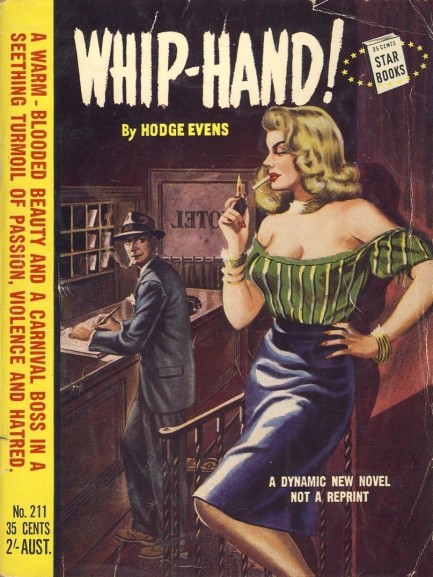
 Once an addict always an addict. 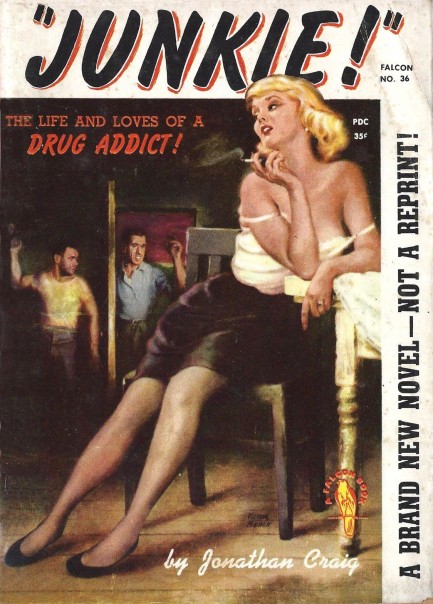
The title of Jonathan's Craig's, aka Frank E. Smith's novel Junkie! is a bit misleading. The junkie in question has little part in the action save as the damsel in distress, mostly kept offpage. But the art by Ketor Seach captures the book's mood nicely, even if it highlights someone other than the actual protagonist, a jazz musician named Steve Harper who prowls the mean streets and smoky clubs of Washington, D.C. trying to solve a murder, then another, then another. A trio of beautiful women keep him thoroughly baffled, and a specially made couch plays a crucial role. Harper's characterization as an actual musician is thin, but the book is a good read, with short chapters and spare prose. Though the fertile milieu could have led to a higher quality result, we recommend the final product.
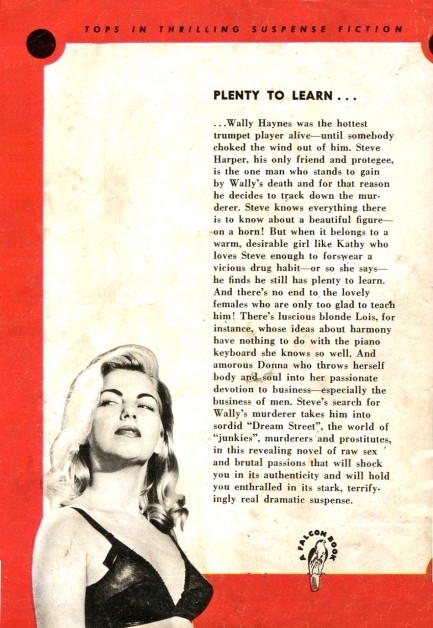
|
 |

The headlines that mattered yesteryear.
2003—Hope Dies
Film legend Bob Hope dies of pneumonia two months after celebrating his 100th birthday. 1945—Churchill Given the Sack
In spite of admiring Winston Churchill as a great wartime leader, Britons elect
Clement Attlee the nation's new prime minister in a sweeping victory for the Labour Party over the Conservatives. 1952—Evita Peron Dies
Eva Duarte de Peron, aka Evita, wife of the president of the Argentine Republic, dies from cancer at age 33. Evita had brought the working classes into a position of political power never witnessed before, but was hated by the nation's powerful military class. She is lain to rest in Milan, Italy in a secret grave under a nun's name, but is eventually returned to Argentina for reburial beside her husband in 1974. 1943—Mussolini Calls It Quits
Italian dictator Benito Mussolini steps down as head of the armed forces and the government. It soon becomes clear that Il Duce did not relinquish power voluntarily, but was forced to resign after former Fascist colleagues turned against him. He is later installed by Germany as leader of the Italian Social Republic in the north of the country, but is killed by partisans in 1945.
|

|
|

It's easy. We have an uploader that makes it a snap. Use it to submit your art, text, header, and subhead. Your post can be funny, serious, or anything in between, as long as it's vintage pulp. You'll get a byline and experience the fleeting pride of free authorship. We'll edit your post for typos, but the rest is up to you. Click here to give us your best shot.

|
|




















































































